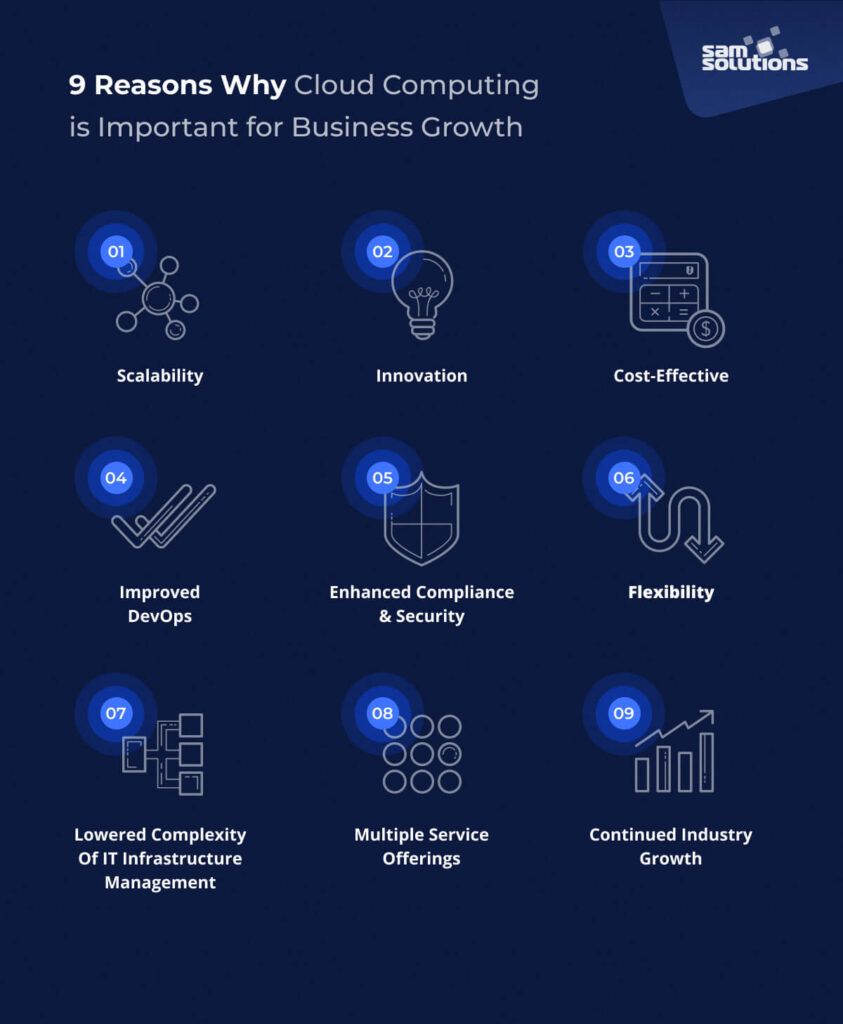Top Benefits of Cloud Computing: Why Your Business Should Make the Move
Estimated reading time: 10 minutes
Key Takeaways
- Cloud computing offers scalability, flexibility, and cost-efficiency for businesses.
- Adopting cloud solutions can streamline operations and enhance collaboration.
- Cloud technology provides advanced tools like AI and machine learning to foster innovation.
- Businesses can achieve better data management and faster time-to-market with cloud services.
- Real-world examples, such as Netflix, demonstrate the transformative power of cloud computing.
Table of Contents
- Introduction
- What is Cloud Computing?
- Cloud Computing Advantages
- Why Use Cloud Computing?
- Cloud Computing Pros
- Cloud Technology Benefits
- Business Benefits of Cloud Computing
- Cloud Computing Benefits for Companies
- Case Studies/Examples
- Conclusion
- Frequently Asked Questions
Introduction
In today’s digital age, the benefits of cloud computing have become indispensable for businesses seeking scalability and efficiency. This article explores the top cloud computing advantages, why use cloud computing, and how it can transform your business operations.
What is Cloud Computing?
Cloud computing is the delivery of on-demand computing services over the internet, allowing businesses to access storage, processing power, and applications through remote data centers managed by cloud service providers. This eliminates the need for maintaining physical servers, offering flexibility and efficiency.
Cloud Computing Advantages
Adopting cloud solutions presents several advantages:
- Scalability: Businesses can easily adjust resources to meet changing demands. For example, “One of the key cloud computing advantages is scalability, enabling businesses to seamlessly scale their resources up or down based on demand.”
- Flexibility: Access services and data from anywhere with an internet connection. “Cloud technology benefits include unparalleled flexibility, allowing teams to access data and applications from any location with internet access.”
- Cost-efficiency: Pay only for the resources used, reducing capital expenses. “Cost-efficiency is a significant advantage, as businesses pay solely for the resources they utilize, minimizing upfront capital expenditures.”
Why Use Cloud Computing?
Businesses and individuals choose cloud computing for various reasons:
- Streamline Operations: Cloud solutions simplify business processes.
- Reduce IT Infrastructure Costs: Save on hardware and maintenance expenses.
- Enhance Collaboration: Improve teamwork through cloud-based tools.
- Improve Data Security: Benefit from advanced security measures provided by cloud providers.
- Accelerate Innovation: Foster innovation by accessing advanced technologies.
“Businesses choose cloud computing to streamline operations, reduce IT infrastructure costs, enhance collaboration, improve data security, and accelerate innovation.”
Cloud Computing Pros
- Enhanced Collaboration: Teams can work together seamlessly across different locations. “Enhanced collaboration is a major pro, enabling teams to work together seamlessly regardless of their physical locations.”
- Automatic Updates: Cloud providers handle software and security updates automatically. “Automatic updates ensure that software and security patches are managed without manual intervention, keeping systems up-to-date.”
- Disaster Recovery: Data is backed up and easily recoverable. “Disaster recovery is simplified as data is regularly backed up and easily recoverable in case of unforeseen events (AWS Whitepaper).
- Environmentally Friendly: Reduced energy consumption compared to on-premises data centers. “Cloud computing is environmentally friendly, reducing energy consumption compared to traditional on-premises data centers (GlobalDots Blog).
Cloud Technology Benefits
The technological benefits of cloud computing include:
- Improved Performance: Access to high-performance computing resources. “Improved performance is achieved through access to high-performance computing resources that can handle intensive tasks efficiently.”
- Reliability: Robust uptime guarantees provided by cloud providers. “Reliability is a key benefit, with cloud providers offering robust uptime guarantees to ensure continuous availability.”
- Advanced Technologies: Leverage AI, machine learning, and big data analytics. “Cloud technology allows businesses to leverage advanced technologies like AI, machine learning, and big data analytics (DartPoints Guide).
Business Benefits of Cloud Computing
- Operational Efficiency: Streamline processes and automate tasks. “Operational efficiency is enhanced as cloud solutions streamline business processes and automate routine tasks.”
- Reduced IT Costs: Minimize hardware and maintenance expenses. “Reduced IT costs are achieved by minimizing expenses related to hardware purchases and maintenance.”
- Better Data Management: Centralized data storage and analytics capabilities. “Better data management is possible through centralized storage and powerful analytics tools provided by the cloud.”
- Faster Time-to-Market: Quickly deploy new applications and services. “Faster time-to-market is facilitated by the ability to quickly deploy new applications and services (AWS Overview).
Cloud Computing Benefits for Companies
- Enabling Remote Work: Support distributed teams with cloud-based tools. “Enabling remote work is a critical benefit, as cloud-based tools support distributed teams effectively.”
- Facilitating Innovation: Experiment with new ideas without significant upfront investments. “Facilitating innovation is easier with cloud computing, allowing companies to experiment with new ideas without substantial upfront costs.”
- Supporting Growth: Easily scale resources as the business expands. “Supporting growth is seamless, as businesses can easily scale their resources in line with expansion plans.”
- Improving Customer Experience: Deliver faster, more reliable services. “Improving customer experience is achievable by delivering faster and more reliable services (ECI Solutions Blog).
Case Studies/Examples
Case Study: Netflix
Netflix successfully leveraged cloud computing to support its global streaming service. By migrating to the cloud, Netflix improved its ability to handle massive user traffic, reduced downtime, and accelerated its international expansion (TechTarget).
Conclusion
The benefits of cloud computing are transformative for businesses of all sizes. From cost savings and improved efficiency to enhanced collaboration and innovation, cloud technology offers a competitive edge in today’s digital landscape. Embracing cloud computing is essential for businesses aiming to thrive in a rapidly evolving market.
Frequently Asked Questions
- Is cloud computing secure? Cloud providers implement strict security measures, but users must also follow best practices.
- What are the top cloud providers? The leading providers include AWS, Microsoft Azure, and Google Cloud.
- Can small businesses benefit from cloud computing? Yes! Cloud services offer affordable, scalable solutions for businesses of all sizes.
Call to Action
Ready to harness the benefits of cloud computing for your business? Explore our cloud solutions or contact our experts today to discuss how we can help you achieve your goals.
